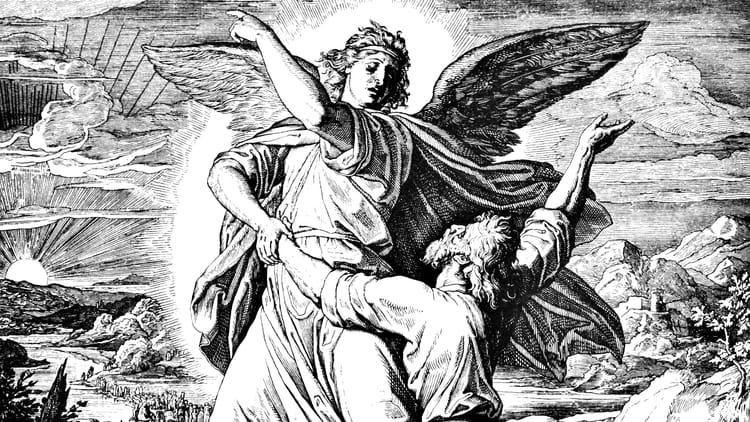Going Radical (Genesis 5)

Don’t you love people watching? We just spent a week on vacation at a resort. I couldn’t help myself. You’d see people, and you’d begin to imagine what their stories might be. For instance, I saw a lot of older men with younger women. I sat there wondering, “Are they father and daughter? Husband and wife?” Everyone has a story, and every story is absolutely fascinating.
If you really want to get to know somebody’s story, you’ve got to learn a bit about their history. You’d have to go back and find out about their life, right back to their first memories. If you really want to learn about them, you have to go back even farther and learn about their parents and grandparents. But that’s not where their story begins. Their story, and your story, goes back much farther than we usually think.
Today, I have one goal and one goal only. I’d like for you to go radical. How many people feel radical today? We usually think of a radical as someone who is extreme and who challenges the norms of culture. The true meaning of radical is related to the idea of going back to the beginning, of returning to your roots. You’re a radical as you trace your story back to the beginning and as you return to your roots. That’s what I want to do today.
Here’s what we often forget: You are a descendent of a family that goes right back to the beginning of time. Your story starts long before you were ever born. Your story is part of a much bigger story.
It’s important to remember where your story begins. We usually think that the opposite of remember is to forget. The opposite of remember is actually to dismember. You’re less than complete when you neglect your history. Because history determines destiny, it’s important for us to go back to our roots. It’s important for us to become radicals in the true sense of the word: that we have gone back to the beginning and understand where our story really begins.
So today, I’d like to begin to look at Genesis so we can begin to understand our story. I want to look at the start of our story, at the beginning of a lineage that, if continued, goes directly to you. Genesis 5 is the type of passage we normally skip over, but it’s the start of your family tree. This story is your story. Here’s how it all starts:
This is the history of the descendants of Adam. When God created people, he made them in the likeness of God. He created them male and female, and he blessed them and called them “human.”
When Adam was 130 years old, his son Seth was born, and Seth was the very image of his father. After the birth of Seth, Adam lived another 800 years, and he had other sons and daughters. He died at the age of 930… (Genesis 5:1-5)
And so on, right down to you. This is your story. It’s how we got to where we are today. If we’re going to understand the end of the story, you’ve got to understand how it all began. That’s why I want to start to look at Genesis, the first book of the Bible, as it describes the beginning of our story.
You may wonder why we would look at a document that’s thousands of years old in order to understand ourselves today. You wouldn’t be alone in asking this question. As we start to look at this book, I think we’ll be surprised that it’s not a dusty document that has nothing to say to us today. As you’d expect, since it’s your story, it has a lot to do with understanding ourselves today.
Understanding our Stories
Anyone here struggle with doing stuff that is wrong? Sure, we all do. We get ourselves into harmful habits and patterns that we know are wrong, but we continue to struggle with them. I remind myself of the mouse I once caught. This was a smart mouse. It got caught in the mouse trap, and played dead. When I released it from the trap, it went scurrying out. But the mouse wasn’t smart enough to remember to avoid the mouse trap. A day later, it came back and I got it for good. I can relate to that. I get caught in patterns, and I know the consequences, but I still keep coming back. This story is going to help us understand why we act this way.
Then there are relationships. Anyone here have relational issues? I’m sure most of us have thought two things regarding the opposite sex, sometimes at the same time: Wow and What? We amaze one other at the same time that we confuse one another. We sometimes ask, “What were they thinking?” If you’re female, you may ask of males, “What were they not thinking?” If you have relational issues, and we all do, then we can begin to understand them better as we look at the first relationships, the first kids, the first marriages. We’ll find that our stories can be traced right back to the relationships in this book.
Then there’s the issue of our aspirations. We long for more despite all that we have. Some of us have everything that we’ve ever dreamed of. We have the jobs that we wanted and we have more money than we ever thought we would earn. Even if we don’t have all the money in the world, we generally don’t long for much. If we really want something badly, we just go out and buy it. Yet we can still relate to the U2 song, I still haven’t found what I’m looking for. We find out why as we begin to read this book.
We’re going to read about the beginning of almost everything – of families, of relational structures, of cities, of societies. We’re going to see people react to adversity and to challenges. We’re going to watch people fall flat on their faces, much the same as we are prone to do from time to time. It’s all there, and it’s all part of our story.
Understanding the Bigger Story
But Genesis offers something more. Scientists these days talk about the theory of everything. They’re looking for that theory that ties all the other theories together, and that provides a unified explanation for everything. You can buy books on the theory of everything. In a sense, the book of Genesis is the introduction to the story of everything. It’s the start of the story that encompasses all of our stories, and that ties them all together.
It’s more than a morality tale. We’re going to look at individual lives. Some of these lives were great. In fact, more than half of the heroes of faith mentioned later in the Bible in Hebrews 11 are from this book. Yet it’s not about how great they were. Most of the people we’ll encounter in this book were flawed in serious ways, just as we are. It’s not so much a story of what happens to good people as much as it is a story of how God relates to imperfect people – in other words, how God relates to people like us.
It’s also the story that provides the backbone to the rest of the stories that we find in the Bible. This is the beginning of the account of God’s activity in this world. It’s a story that is not yet over. The themes that we find in the first pages of Scripture are picked up again in the last pages of Scripture. We find ourselves in the middle, in the unfolding of this story. It’s the story of God’s Kingdom, his activity in the world, what he’s doing all around us. This is how it all began.
Christ and the apostles ate, drank, and slept with this story. This was the Bible that they read, that they digested. We can’t understand their stories unless we know this story.
This is a story of relationships. It’s about God’s relationship to the world, and our relationships with each other. It’s about God’s relationship with us. God is revealed in this book as a relational God. Right from the start, he’s pursuing a relationship with us. We often think of God as stern and judgmental and arbitrary. In this book, God is revealed as someone who wants to be in relationship with us, and as someone who pledges his love and faithfulness to imperfect people, just like us.
There is a story that is unfolding in this world. We’re part of that story. Genesis helps us see where this story begins, and that helps us understand how the story is continuing today.
So What?
Your story goes right back to the beginning. You are part of a bigger story, one that is continuing today.
So what? Well, first, come back! Next week we start right at the beginning. Dive in. Think. Question. Challenge. Interact. We’ll be starting something online that will help you interact with this story as we go through it. Make this story your story.
For today, I want to invite you to go home as a radical. To be honest, I’ve had a lousy week. I had a lot of problems, but none of them were very big. They were just big enough to make me miserable, but not big enough to be significant. As I take a longer view – say, a year – most of this week’s problems don’t even matter. They matter even less from the perspective of a decade. When I go radical, and go right back to the start of the story, things look even more different. The stuff we’re dealing with, which seems so big right now, looks completely different when we remember that we’re part of a bigger story, and one that doesn’t just span weeks or years, but millennia. Our stories look different as we recognize that God is involved in the unfolding of the story, and that he’s not in a rush.
The biggest thing that happens when we go radical is that we understand that our lives can’t be understood unless we realize that God is part of our story, and that the God of this story is a relational God who pledges his love and his faithfulness to imperfect people like us. The story continues, and leads eventually to God himself coming to the world to show us the extent of his love. He is the God who still pursues a relationship with people just like us.
This is how your story begins.





